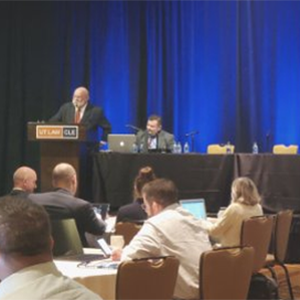
eCourse
Answer Bar: Maximizing Technology in Your Law Practice
Contains material from Jun 2021 to May 2023
Technical Questions?
512.475.6700
service@utcle.org
Session 2: Conducting Cost-Effective E-Discovery and the Use of Technology Assisted Review (TAR) - Examine how technology-based processes, specifically technology assisted review (TAR), can be cost-effective and efficient solutions for e-discovery in litigation. This session highlights situations where TAR is often the preferred tool over attorney review and flags times that it is not, and discusses how to address contentious issues that may arise in TAR-related negotiations with opposing counsel.
Session 3: Social Media Hot Topics - Should social media platforms be civilly liable for the content that their users post? Is the content moderation on platforms like Facebook and Twitter subject to statutes like those passed in Florida and Texas? Come hear the latest on these issues currently before the U.S. Supreme Court, as well as other cutting edge topics in social media - like service of process via social media and even NFTs, the evidentiary value of emoji and memes, and the limits on how lawyers can ethically respond to online criticism.
Session 4: Communication - Attorneys have a duty to keep client communication secure. Get practical tips on conducting communication with the courts or with opposing counsel, as well email filtering and its impacts on communication including filing deadlines, etc.
Session 5: Cybersecurity and Protecting Against Cyber Scams - An informative program about the legal standards that govern a compliant cybersecurity program as well as an update about the ethical duty of technology competence that affects all Texas lawyers.
Session 6: Will Robot Lawyers Steal Our Jobs, and Can They do the Job Ethically? - As artificial intelligence tools like ChatGPT and others have entered the legal sphere, questions naturally arise as to the extent to which AI can satisfactorily complete legal tasks. AI is being widely used for everything from legal research to the drafting of contracts snd pleadings to even assisting with jury selection. But can “robot lawyers” truly replace their human counterparts? This program examines not only the ways in which AI is impacting the legal profession, but also the multiple ethical dimensions of AI use - from our duty of tech competence to our duty to supervise non-lawyers.
Includes: Video Audio Paper Slides
Preview Sessions
Show session details
Hon. John G. Browning
Download session materials for offline use
Session 1 —57 mins
The Duty of Technology Competence (May 2022)
Understand the importance of technology competence for your practice and the ethical obligations to be competent. Explore the current landscape and recent decisions in this area, as well as common problem areas for attorneys.
Originally presented: Apr 2022 Essential Technology Competence for Attorneys
Hon. John G. Browning,
Of Counsel, The Cole Law Firm, McKinney, Texas and Distinguished Jurist in Residence, Faulkner University School of Law - Plano, TX
Show session details
Christine Payne, Hon. Andrew Peck
Download session materials for offline use
Session 2 —47 mins
Conducting Cost-Effective E-Discovery and the Use of Technology Assisted Review (TAR) (Jun 2021)
Examine how technology-based processes, specifically technology assisted review (TAR), can be cost-effective and efficient solutions for e-discovery in litigation. This session highlights situations where TAR is often the preferred tool over attorney review and flags times that it is not, and discusses how to address contentious issues that may arise in TAR-related negotiations with opposing counsel.
Originally presented: Apr 2021 E-Discovery Essentials
Christine Payne,
Gunster - Austin, TX
Hon. Andrew Peck,
DLA Piper LLP US - New York, NY
Show session details
John G. Browning
Session 3
Social Media Hot Topics (Jun 2021)
Should social media platforms be civilly liable for the content that their users post? Is the content moderation on platforms like Facebook and Twitter subject to statutes like those passed in Florida and Texas? Come hear the latest on these issues currently before the U.S. Supreme Court, as well as other cutting edge topics in social media - like service of process via social media and even NFTs, the evidentiary value of emoji and memes, and the limits on how lawyers can ethically respond to online criticism.
Originally presented: May 2023 Technology Law Conference
John G. Browning,
Spencer Fane / Faulkner Law School - Plano, TX
Show session details
Lisa Angelo
Session 4 —30 mins
Communication (May 2022)
Attorneys have a duty to keep client communication secure. Get practical tips on conducting communication with the courts or with opposing counsel, as well email filtering and its impacts on communication including filing deadlines, etc.
Originally presented: Apr 2022 Essential Technology Competence for Attorneys
Lisa Angelo,
Angelo Law Firm PLLC - Houston, TX
Show session details
Elizabeth Rogers
Download session materials for offline use
Session 5 —28 mins
Cybersecurity and Protecting Against Cyber Scams (May 2022)
An informative program about the legal standards that govern a compliant cybersecurity program as well as an update about the ethical duty of technology competence that affects all Texas lawyers.
Originally presented: Apr 2022 Essential Technology Competence for Attorneys
Elizabeth Rogers,
Michael Best & Friedrich LLP - Austin, TX
Show session details
John G. Browning
Session 6 —62 mins
Will Robot Lawyers Steal Our Jobs, and Can They do the Job Ethically? (May 2023)
As artificial intelligence tools like ChatGPT and others have entered the legal sphere, questions naturally arise as to the extent to which AI can satisfactorily complete legal tasks. AI is being widely used for everything from legal research to the drafting of contracts snd pleadings to even assisting with jury selection. But can “robot lawyers” truly replace their human counterparts? This program examines not only the ways in which AI is impacting the legal profession, but also the multiple ethical dimensions of AI use - from our duty of tech competence to our duty to supervise non-lawyers.
Originally presented: May 2023 First Friday Ethics (May 2023)
John G. Browning,
Spencer Fane / Faulkner Law School - Plano, TX